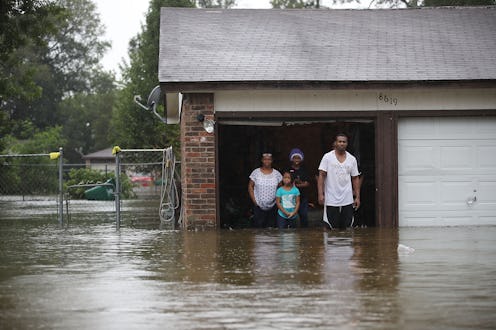News
Here's How Much Flood Insurance Costs People In Texas

Homeowners who've evacuated from areas affected by Hurricane Harvey face another looming challenge: the cost of repairing damages. Most Texas homeowners' policies don't cover flooding. The federal government offers coverage through the National Flood Insurance Program, which costs on average between $600-800, but the majority of Harvey victims don't have flood insurance. In the major city hit hardest by the hurricane, an estimated 85 percent of Houston homeowners are not covered for flood damage and the total out-of-pocket costs for all flooded homeowners could reach $28 billion.
While corporations will most likely weather the financial blow, homeowners are at risk of bankruptcy. Insurance experts told the Associated Press that most families who suffered damages from Hurricane Harvey will have to rely on personal finances or take on more debt to pay for flooded houses, soaked furniture, and water-damaged walls. Those who can't cough up the money may be forced to sell what can be salvaged, total their cars, or move away from their communities.
Flood insurance is not required for most of these people because they don't live in vulnerable "high-risk" zones that make up the "100-year flood plain," as determined by the National Flood Insurance Program's years — even decades — out-of-date flood projection map. Homeowners insurance usually covers wind damage, not flood damage unless related to wind (such as a window being blown off and allowing water in). Houston, unlike Corpus Christi and Rockport, suffered more from flooding than wind destruction.
Poor predictions based on this outdated map have set the national program $24 billion in debt following Hurricanes Katrina and Rita in 2005, and Hurricane Sandy in 2012. Those ravaged by Harvey may try to collect federal grants, but are picking at limited funds.
This all comes after experts warned city officials that Houston was a "sitting duck" for hurricanes after Hurricane Ike caused $30 billion of property damage in the Houston and Galveston area nine years ago. Storms and torrential downpour have become more frequent and severe in the area, unhelpfully exacerbated by climate change, scientists said in ProPublica's and Texas Tribune's 2016 project "Hell and High Water," which gives a forewarning about Houston's precarious situation.
After a series of back-to-back storms, federal officials joined scientists in blaming unchecked development in the Houston metropolitan area for endangering homes. As millions of people moved to the area in recent decades, local officials helped turn Houston into a "Boomtown, Floodtown" by allowing developers to build over important prairie land that once absorbed large amounts of rainwater. Since that excess rainwater still has to go somewhere, floods end up straining Houston's bayou network and drainage system. After Harvey hit, it's clear something has to change.